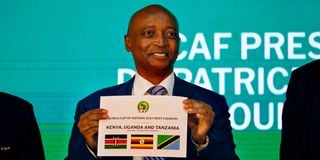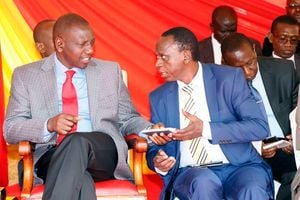Qualifying for 2028 Olympics will be good legacy for hosting Afcon

Patrice Motsepe, president of the African Confederation of Football (CAF), announces the host countries for the 2027 Africa Cup of Nations during a ceremony held in Cairo on September 27, 2023.
What you need to know:
- At the National Olympic Committee of Kenya, we quickly dissected what this means, as the next milestone for us is the 2028 Los Angeles Olympic Games.
- The 2027 Afcon is expected to be in the months of June-July 2027, exactly one year to the 2028 Olympics.
This week has been one of celebration and excitement, after we got the news that Kenya, Tanzania and Uganda had won the rights hosting rights for 2027 African Cup of Nations (Afcon).
At the National Olympic Committee of Kenya, we quickly dissected what this means, as the next milestone for us is the 2028 Los Angeles Olympic Games.
The 2027 Afcon is expected to be in the months of June-July 2027, exactly one year to the 2028 Olympics.
And as we reflect on these milestones, we must reflect on the desired legacy of hosting the Afcon. Since the announcement, I have read and heard a lot of discussions about what we stand to benefit from hosting.
The outstanding ones being our national team qualifying directly, a huge benefit in itself considering we have missed the last two editions. The other major benefit being discussed is the renovation of stadia and possible construction of a new international standard stadium.
One critical aspect that seldom spoken about is the sport development aspect involving players. Philosophies on the subject place the potential of stimulating sport development as one of the main objectives of hosting major sport events.
Sport development is about enabling structures and opportunities for involvement and excelling in sport.
From the NOC-K standpoint, the best outcome we can get as a country is the national team qualifying for the Los Angeles 2028 Olympics.
Kenyan football has never been to the Olympics. This will demonstrate the benefits of hosting going beyond the event itself. We could dare to dream about podium finish, following the footsteps of our African counterparts, Nigeria and Cameroon who won the Olympic Gold in 1996 and 2000 respectively.
Sustainability of sports events and particularly on legacy planning is one of the weaknesses by sports organisations in hosting events. We need to however be aware as sports organisations that legacy starts from planning.
As we put down our strategies of planning to host, we need to be very deliberate on the desired outcomes and start planning for it now.
This is what is often referred to as leveraging an event. Most sports development outcomes are often unplanned, as for instance, we expect that the interest in football will grow all over the country, leading to more children choosing football as their sport, having been inspired by elite athletes.
If we are deliberate therefore in leveraging the hosting, it can have an even bigger impact on those already playing football, including developing a strategy to develop an Olympic team alongside preparing the AFCON team.
Remembering that Olympic Football for the men requires 15 of the 18 players to be aged 23, plus three professionals above this age limit. This means the prospective men’s team to the Olympics are 19 years and below today.
We have the targets, we have the opportunity, we have the time, let’s make it count.
Mutuku is the Secretary General of the National Olympic Committee of Kenya. [email protected]




